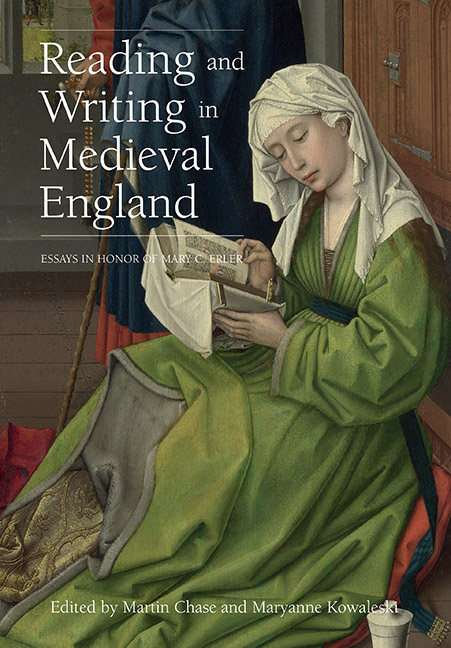Book contents
- Frontmatter
- Contents
- List of Illustrations
- List of Contributors
- List of Abbreviations
- Introduction: Bibliography in the Service of Biography
- “Withinne a Paved Parlour”: Criseyde and Domestic Reading in a City under Siege
- Beatrice Melreth: A London Gentlewoman and her Books
- How Intellectual Were Fifteenth-Century Londoners? Grammar versus Logic in the Citizens’ Encounters with Learned Men
- Social Memory, Literacy, and Piety in Fifteenth-Century Proofs of Age
- Crafting the Old Testament in the Queen Mary Psalter
- Affective Reading and Walter Hilton's Scale of Perfection at Syon
- Book Accessories, Gender, and the Staging of Reading
- Enska Vísan: Sir Orfeo in Iceland?
- Reading the Real Housewives of John Foxe's Book of Martyrs
- The Writings of Mary Carpenter Erler
- Index
- Tabula Gratulatoria
How Intellectual Were Fifteenth-Century Londoners? Grammar versus Logic in the Citizens’ Encounters with Learned Men
Published online by Cambridge University Press: 21 June 2019
- Frontmatter
- Contents
- List of Illustrations
- List of Contributors
- List of Abbreviations
- Introduction: Bibliography in the Service of Biography
- “Withinne a Paved Parlour”: Criseyde and Domestic Reading in a City under Siege
- Beatrice Melreth: A London Gentlewoman and her Books
- How Intellectual Were Fifteenth-Century Londoners? Grammar versus Logic in the Citizens’ Encounters with Learned Men
- Social Memory, Literacy, and Piety in Fifteenth-Century Proofs of Age
- Crafting the Old Testament in the Queen Mary Psalter
- Affective Reading and Walter Hilton's Scale of Perfection at Syon
- Book Accessories, Gender, and the Staging of Reading
- Enska Vísan: Sir Orfeo in Iceland?
- Reading the Real Housewives of John Foxe's Book of Martyrs
- The Writings of Mary Carpenter Erler
- Index
- Tabula Gratulatoria
Summary
One of the most striking themes to emerge from Sylvia Thrupp's magisterial study, The Merchant Class of Medieval London, is the Londoners’ lack of “intellectual curiosity or initiative.” Wherever she looks in the merchants’ culture, despite the impressive evidence of literacy and book ownership that emerges, Thrupp can find only a faint “intellectual stirring,” one that “fed primarily upon religious interests” in a disappointingly “meditative and reflective” way. To a social historian of the 1940s like Thrupp, that is scarcely intellectual activity at all – nothing like the “fully developed religious or political ideas” she admires in the vibrant debates of the Calvinist reformers. Thrupp is clearly frustrated by the Londoners’ failure to question “dominant assumptions” about the social order or to “probe” the political issues they faced as governors of the city. “When business affairs were laid aside, they could listen with interest to preaching; otherwise they preferred convivial relaxation to intellectual discussion.”
What are we to make of these views today, given our present understanding of the Londoners’ religious and political culture? Has our view of the Londoners’ intellectuality changed because we know they had their own passionate reformers, orthodox and Lollard, or because we understand the forms of censorship that produced “intellectual inhibition” in the public sphere? For many scholars, Thrupp's formulations have continued to be highly influential: for example, Malcolm Richardson remarks on the “intellectual limits” and lack of “intellectual curiosity” in the citizens’ letter writing and commonplace books. But others have used her terminology to make the opposite point. Anne Sutton finds the London mercers to be “intellectually curious” and “intellectually ambitious” owners of historical and literary texts, who occasionally ventured into Lollardy and alchemy. Mary Erler, the dedicatee of this volume, has emphasized the intellectual potential of the books London women shared with their learned spiritual advisors, which though mainly devotional, could sometimes demand sophisticated interpretive strategies and critical thinking.
Taking my cue from Erler's pairings of London women and their learned advisors, I propose to revisit the question of the Londoners’ intellectuality by looking at a series of encounters between citizens and the bona fide intellectuals in their midst – the university graduates who brought academic learning to the metropolis and disseminated it there.
- Type
- Chapter
- Information
- Reading and Writing in Medieval EnglandEssays in Honor of Mary C. Erler, pp. 56 - 80Publisher: Boydell & BrewerPrint publication year: 2019



